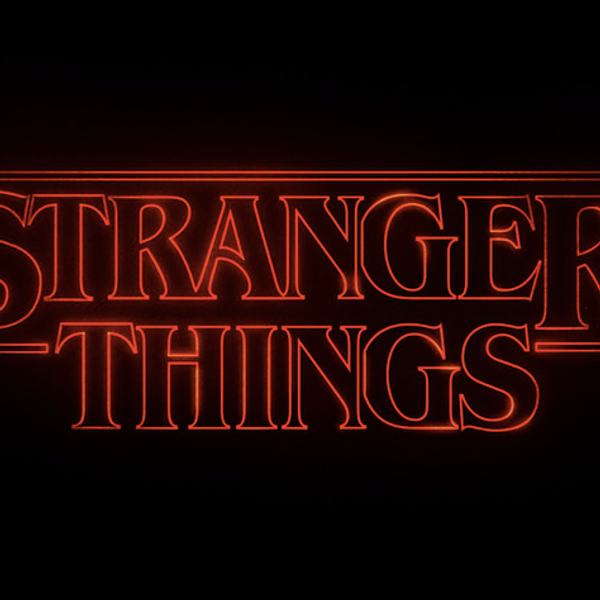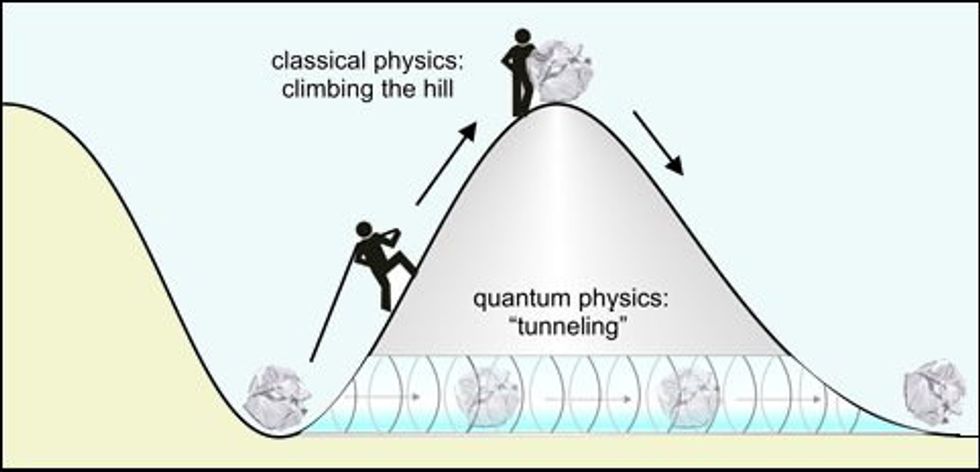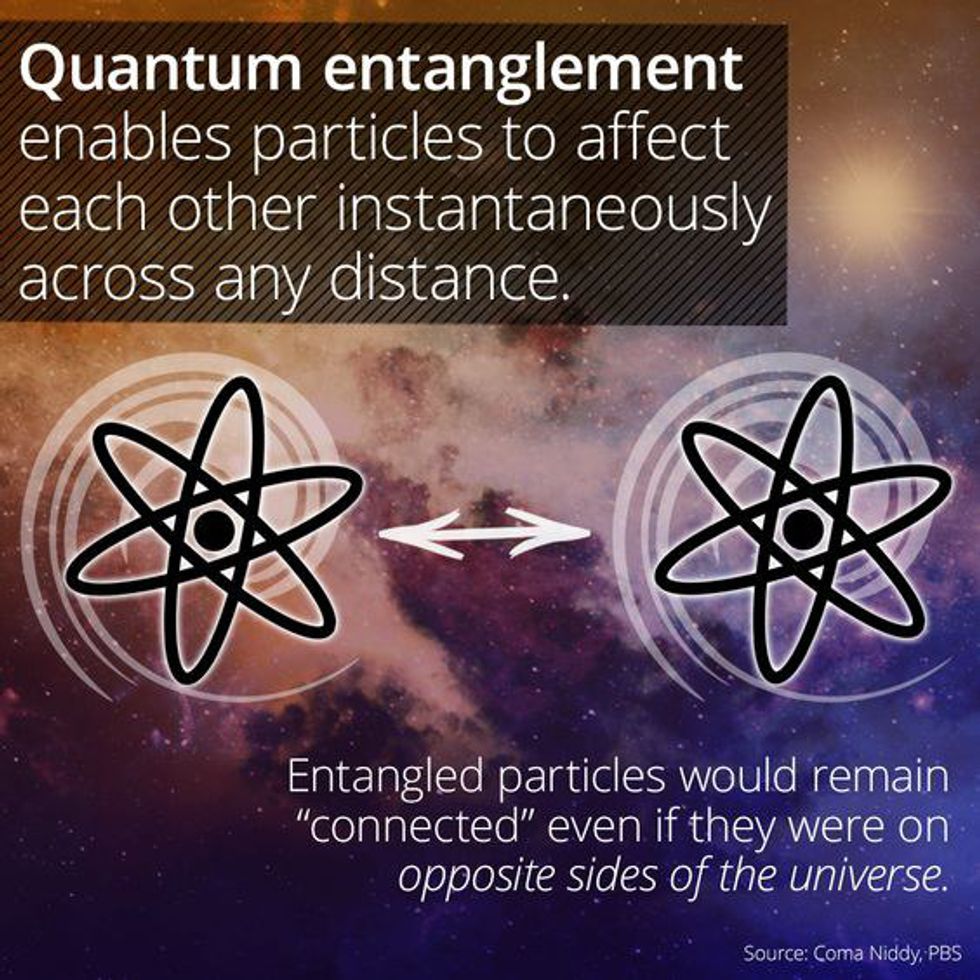Quantum physics is literally the weirdest thing in the universe. It is so weird that, as physicist Niels Bohr said, "those who are not shocked when they first come across quantum theory cannot possibly have understood it." Today we will explore the shocking weirdness of the quantum world.
But what does "quantum physics" even mean? Roughly speaking, the term "quantum" means "the smallest possible unit." That is why it has the same root word as "quantity" or "quantify" — all of those words deal with separate, distinct units. So, to keep things less confusing, replace the phrase "quantum particle" with "really tiny thing." Quantum physics is the physics of the tiniest things in the universe.
With that confusion cleared up, let's dive headfirst into more confusion. Here are four of the craziest facts that physicists have ever discovered about tiny things by throwing math at each other.
1. Virtual Particles: Some tiny things pop in and out of existence randomly.
We like to imagine that "empty space" is empty. It's not. Empty space is full of energy. And, randomly, a pair of particles will pop into existence out of that energy. One of those particles is made of matter, and one of them is made of antimatter. Antimatter is a confusing subject too, with many explanations available online, but for now all you need to know is that if they touch each other, then they explode and disappear. A billionth of a second or so after they appear, virtual particles will crash into each other and cease to exist.
Virtual particles appear to violate a big assumption from classical philosophy and from common sense: everything that exists needs to have a cause. Still, that is not the only assumption that we have had to throw out the window because of quantum physics...
2. Superposition: The smaller something is, the more likely it is to be in multiple places at once.
Imagine a person standing in a dark room. Once you turn on the light, you will see where the person is. But until you turn on the light, you don't know where the person is.
Let's imagine that the person is really small. If you started flipping the light switch on and off really fast, they would usually be in the same spot each time — but sometimes they wouldn't. One flip of the switch could put them in the middle of the room, and another flip could put them in the corner. Before you turn on the light, they are simultaneously everywhere in the room.
Location is a set of different probabilities that all exist at the same time. Before a quantum particle is measured, forcing it to choose a location, it is in a state of "superposition" between all probable locations. The set of locations that something will probably exist in — its "de Broglie wavelength" — gets smaller when that something gets bigger.
3. Quantum Tunnelling: Tiny things can teleport.
Let's talk about the person in the dark room again. That person can be in different places every time you turn on the light. But if you walled off the corner of the room, then they could still appear in that corner if you flipped the light switch enough times. Even though they are usually on one side of the wall, they are sometimes on the other side. From your perspective, it looks like the person teleported through the wall!
Just like superposition, big things are much less likely to teleport than small things. When something randomly jumps from one side of a barrier to the other between measurements, we call that "quantum tunnelling."
4. Entanglement: Tiny things can communicate faster than light.
Imagine two hills. Each hill has a person on it. The absolute fastest possible way for those people to communicate is by using something like a flashlight, since light is the fastest thing in the universe.
Now let's imagine that the hills and the people are really small. The people shook hands before climbing the hills, so something that affects one of them will immediately affect the other. For example, if you walk up one hill and slap the person in the face (rude!) then the other person will immediately feel it too — even if the hills are 10 billion miles away from each other.
Actually, let's go back to the person in the dark room. This time, there is one room across the street from you and one room in Venezuela. The people in the rooms can either be sitting or standing. If you turn on the light in one room, and you see that the person is sitting, then the person in the other room will immediately be standing even though they are in Venezuela.
Albert Einstein hated the idea that information can travel instantaneously, which he dismissed as "spooky action at a distance." He thought that there were some kind of hidden variables which could explain this without breaking the universe's speed limit (thou shalt not travel faster than light). However, John Bell came up with an ingenious experiment to test "spooky action at a distance" against Einstein's competing theory, and found that Einstein was wrong. Particles that are "entangled" can communicate faster than light.
A few different ideas have been floated to explain entanglement, including wormholes (entangled particles are physically connected through "tunnels" that connect different points in space-time) and the many-worlds interpretation of quantum physics (every possibility happens, each one in a different universe). It is not yet clear if either of these insane ideas is true, but for now we can sit back and take a moment to appreciate the insanely counterintuitive ideas that quantum physics has discovered as true within the last century. As Peter Atkins said,
[n]o other theory of the physical world has caused such consternation as quantum theory, for no other theory has so completely overthrown the previously cherished concepts of classical physics and our everyday apprehension of reality ... The extraordinary feature of quantum theory is that although we do not understand it, we can apply the rules of calculation it inspires, and compute properties of matter to unparalleled accuracy, in some cases with a precision that exceeds that currently obtained from experiment.
For more information, watch some of PBS Space Time's videos about quantum physics:

























